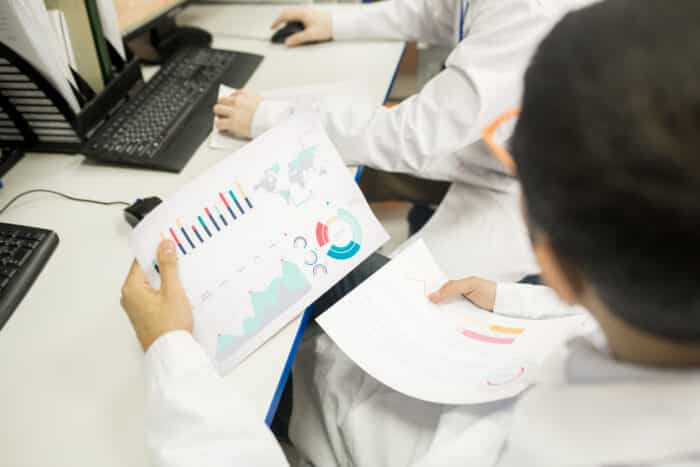Pharmacists and pharmacy technicians are both skilled experts who ensure the smooth operation of pharmacies and also make sure that the patients receive the correct medication.
You’ll find a pharmacist and a pharmacy technician working closely. The pharmacist delegates various daily tasks to the pharmacy technician; the technician relies on the pharmacist for advice and assistance.
While each position has specific requirements and duties, what are the major differences between the two careers?
Let us discover the differences in this article.
Roles and Responsibilities
Both pharmacists and pharmacy technicians have direct interactions with patients, doctors, and insurance companies.
In a pharmacy setting, you’ll find both pharmacists and pharmacy technicians have direct interactions with patients, doctors, and insurance companies.
But when it comes to accountability, a Pharmacy Technician is accountable and answerable to a Pharmacist as the Pharmacist oversees the work of pharmacy technicians.
Let’s take a closer look at the roles and responsibilities of each profession.
Pharmacy Technician
A day in the life of a Pharmacy Technician has a lot of tasks to fulfill such as;
- Gathering patient information to fill prescriptions
- Communicating with customers who visit the pharmacy.
- Processing and settling payments
- Managing inventory.
- Filling prescriptions and getting them ready for approval by the pharmacist.
- Handling insurance and acting as a liaison between insurance companies and the patient.
- Other administrative tasks such as billing, record keeping, and insurance paperwork
Read More at Pharmacy Technician Skills & What Does a pharmacy technician do
Pharmacist
- Supervise and manage daily pharmacy orders and ensure medicines are dispensed accurately.
- Ensure accuracy after reviewing all the prescriptions
- Verify patients’ records and ensure there isn’t any miscalculation or error
- Guide patients on the proper and effective use of medications
- Ensure compliance with all local, state, and federal laws within the pharmacy
In national retail pharmacies, retail stores, and independent pharmacies, you’ll find both pharmacy techs and pharmacists working together. (Related: Where can Pharmacy Technicians Work)
If we talk about the legal aspect, pharmacy technicians can fill patient prescriptions, provided they are reviewed by a pharmacist before they are sold to the customer. However, pharmacy technicians are not allowed to suggest or recommend medicines to patients.
Read More: What is a Pharmacy Technician?
Pharmacy Technician Compounding
Education
The level of education is the major difference between a pharmacist and a pharmacy technician. While a pharmacist must complete a degree program, a pharmacy technician doesn’t need a degree. They, however, have to attend a training program.
The course duration for a pharmacy tech lies between eight weeks to two years, depending on the program. Certificate programs generally take less than a year, while an associate degree takes up to two years to complete. (Related: How long does it take to become a pharmacy technician)
Pharmacists, as stated earlier, have to get a degree, and that can take 4-6 years.
The pharmacy technician training program covers core courses in the following:
- Inventory management
- Pharmacy calculations
- Anatomy
- Pharmacology
- Pharmacy laws/ethics
- Dosage
Whereas, Pharmacist training courses cover the following subjects in addition to what a technician will learn:
- Pharmacy Practice
- Physiology
- Chemical and molecular Pharmacology
- Therapeutics
- Medical Biochemistry
How to Become a Pharmacy Technician vs. Pharmacist?
Pharmacy Technician
Pharmacy technicians in most states are required to complete a pharmacy technician training program; You can choose a full-time associate degree program, or you can also go for pharmacy technician online schools.
These educational programs help pharmacy technicians prepare for and successfully pass the Pharmacy Technician Certification Exam (PTCB). Once you clear the exam, you’re a certified pharmacy technician.
Read More: How to Become a pharmacy technician
SEE MORE ON PREPPY’S ONLINE PHARMACY TECHNICIAN PROGRAM HERE>
Pharmacists
Pharmacists have the option to pursue a six-year educational program, starting with two years dedicated to courses in subjects like chemistry, biology, math, and English. This is then followed by four years of specialized pharmacy study.
Alternatively, if students have already obtained a four-year bachelor’s degree, they must complete an additional four-year doctoral program to earn a PharmD.
Licensing and Certification
The requirements for licensing and certification for pharmacy technicians are not the same, and they vary from state to state.
However, in all states, pharmacists typically have to pass –
- National licensing examination
- Local state law examination
Pharmacy Technician
Licensing requirements for a pharmacy technician are set by the states and can be classified into three categories:
- Mandatory license/registration:
Some states require pharmacy technicians to obtain a license or registration to practice.
- National certification and license/registration required:
Certain states mandate pharmacy techs to be certified and obtain a license as well.
- No license or certification requirements:
In some states, there are no specific obligations for pharmacy technicians to hold a license or certification.
Pharmacist
A Pharmacist is required to undergo two licensing exams upon completion of a PharmD program:
- North American Pharmacist Licensure Exam (NAPLEX)
- Multistate Pharmacy Jurisprudence Exam (MPJE
You can either take the MJPE or the state exam. To determine the specific exam required by a state, one must contact the licensing board of their respective state.
Once the exams have been taken, the individual can apply for a license.
Some states may have additional requirements like verifying family background, submission of proof of pharmacy internships, or completion of further training. Licensed pharmacists have the opportunity to earn specialized certifications in various areas offered by the Board of Pharmacy Specialties (BPS).
These areas include:
- Cardiology
- Ambulatory Care
- Critical Care
- Infectious Diseases
- Nutrition Support
- Compounded Sterile Preparations
- Oncology
- Pediatric
- Pharmacotherapy
- Psychiatric
- Solid Organ Transplantation
Salary and Job Outlook
The Pharmacy Technician’s Salary was $36,740 in May 2021, whereas the median annual wage for pharmacists was $128,570 in May 2021, according to the U.S. Bureau of Labor Statistics (BLS).
So, if we compare both of these, the average annual salary of pharmacists is much more than a pharmacy technician.
According to BLS, the job outlook for both these professions tells a different story. While pharmacy technician jobs are expected to grow by 5% through 2031, the jobs for pharmacists are expected to grow by 2.4% through 2031.
This shouldn’t come as a surprise. Typically, in a pharmacy, you’ll find multiple technicians, but there’s usually only a single pharmacist overseeing them.
How to Choose Between Them?
Pharmacy technician positions offer an excellent opportunity for individuals seeking a fulfilling healthcare career without the need for a four-year degree. (Read More: Pros and cons of being a pharmacy technician & Pharmacy Technician Facts)
But, if your aspirations include a managerial position, a higher initial salary upon completing your education, or engaging in clinical research, a career as a pharmacist might be better suited for you.
You can also choose to become a pharmacist assistant. Here’s everything you need to know about Pharmacy Assistant vs Pharmacy Technician
Conclusion
While both pharmacy technicians and pharmacists play crucial roles in the healthcare system, they have distinct responsibilities. Pharmacists are highly trained professionals who focus on medication management, patient consultation, and ensuring overall healthcare safety.
On the other hand, pharmacy technicians provide valuable support by assisting with medication dispensing, inventory management, and maintaining a smooth workflow in pharmacies. Both roles contribute collaboratively to delivering safe and effective pharmaceutical care.
Understanding the differences between a pharmacy technician and a pharmacist helps create a well-coordinated healthcare team, ensuring that patients receive the best possible care.
Related sources:
Traveling Pharmacy Technician
Pharmacy Technician FAQ
Pharmacy Technician Job Description
Hospital Pharmacy Technician
Certified Pharmacy Technician
Pharmacy Technician Certificate
Pharmacy Technician Training
Pharmacy Technician Programs
Pharmacy Technician Courses
Related Articles
-
How to Be Successful in College in 2022 – 7 Simple Tips to Succeed
-
How Do Scholarships Work? Read This First…Truth is Shocking
-
7 Best College Majors 2024: What Should I Major In?
-
How to Choose a College – 10 Things You Must Consider in 2024
-
Why Go to College? Top 13 Benefits for Adult Students in 2022
-
Top 5 Best Alternatives to Community College for 2024









